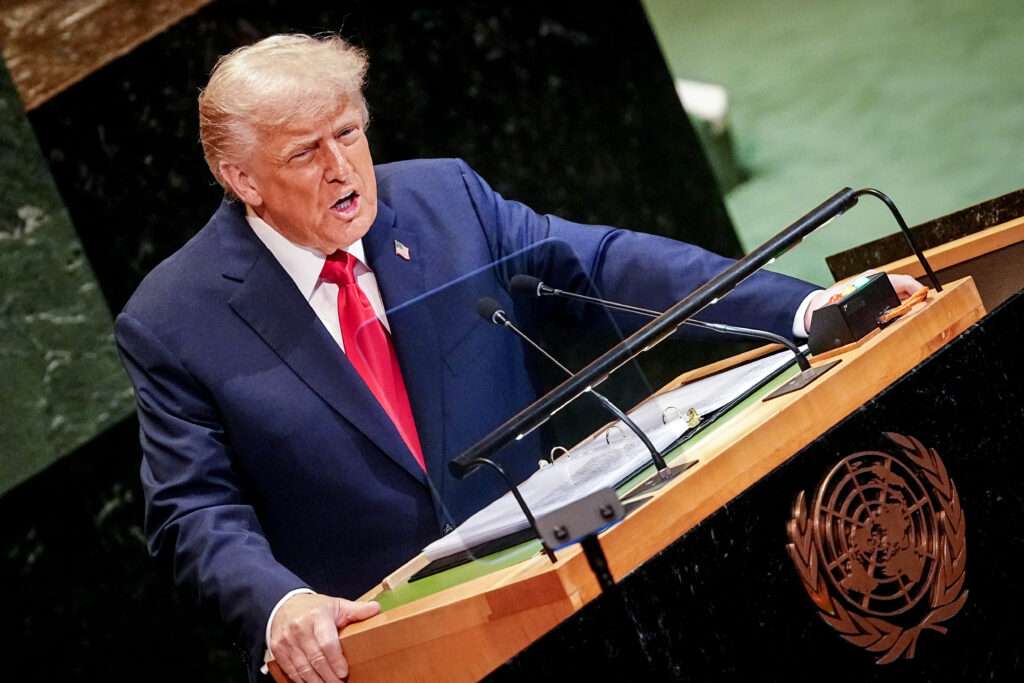Interviews / Political and Geostrategic Observatory of the United States
25 September 2025
American Democracy Put to the Test by Trumpism

While the United States endured a turbulent September marked by events putting the country’s internal fractures in the spotlight (the assassination of ultra-conservative influencer Charlie Kirk elevated to martyr status, the temporary dismissal of Jimmy Kimmel by ABC challenging freedom of expression…), Donald Trump seized the stage at the United Nations General Assembly to reaffirm his own political agenda: hostility to immigration, climate denial, contempt for the UN system, and a worldview deeply centered on American interests. What state of affairs can we observe in American society and regarding the place of the United States within the international system? What about the future of Trumpism, as the midterm elections approach? Marie-Cécile Naves, director of research at IRIS and author of Géopolitique des États-Unis (Eyrolles, 2nd edition, 2025), discusses this.
What do the assassination of the ultra-conservative influencer Charlie Kirk and its political instrumentalisation, as well as the (temporarily reversed) dismissal of television host Jimmy Kimmel, tell us about the state of U.S. society, at a moment when some foundational elements of American democracy appear compromised?
Kirk’s horrific death (which falls within a long tradition of political violence in the U.S.) becomes a turning point because it is being instrumentalised by MAGA supporters to fuel a narrative of revenge and hate against political adversaries (or those perceived as such—broadly including journalists, scientists and comedians).
According to Steve Bannon, Kirk’s death constitutes “an act of war.” Elon Musk stated that “the left is the party of murder.” For some time, internal enemies have been designated, denunciations against academics and teachers called for, and racial profiling in policing validated by the Supreme Court. This tragedy serves as a continuation of all that.
The U.S. President ordered flags to be flown at half-mast for several days, as if the nation were in mourning, despite Kirk holding no official public office. This gesture underscores a crucial point: it further recognises internet influencers, whom emerged from nowhere, as legitimate political actors. Donald Trump and J.D. Vance owe much to him: the former because Kirk was one of the architects of the generational renewal of the white, male Trumpist electorate, and the latter because he sought to bring Kirk closer to Trump’s inner circle.
On one hand, Kirk is portrayed by MAGA as a champion of debate (which he was not), and on the other, his death is used as a pretext to suppress any form of discourse. Freedom of speech is guaranteed in the U.S. by the First Amendment. Yet it is becoming more condemnable to say “Kirk was far right” than to say “the brains of black women are malfunctioning” (the latter being a quote from Kirk himself).
We recall accusations of cancel culture against the left: but in reality it is the Trump administration demanding firings of journalists or teachers, banning books in libraries, dictating museum and theatre programming, or defining Democrats as “terrorists” (terrorists are to be imprisoned, not debated).
All this aligns perfectly with “Project 2025,” the messianic renewal promise of a Peter Thiel (a donor to Vance’s campaigns) or a “regeneration” of American society cleansed of its undesirables. Ultimately, Kirk’s death merely provides justification and acceleration for a project already underway.
The multilateral system is in crisis, and Donald Trump is not one to call for its rescue. In his speech before the UN General Assembly on 23 September 2025, the American President attacked the organisation, calling into question its utility. How can one define the ideology emerging from that speech? What is the impact of his remarks within the international community?
Nothing in his discourse is new: whenever he addresses the UN, Trump insults the world. He thus attempts to coerce us into reacting to a quip, creating a buzz that avoids serious discussion of geopolitical substance and, in particular, reveals his lack of strategy and vision. The number of frozen or intensifying conflicts—especially in Ukraine and the Middle East—has increased since his re-election.
The uncertainty he has created economically and commercially is immense (erratic tariffs, prohibitive visa-taxes on H-1B, constant reversals). China is strengthened in the non-Western world, positioning itself as a stability pole that fills vacuums left by the U.S. The rift with India carries heavy consequences for power balance in Asia. The end of USAID leaves holes in Western intelligence networks, weakens American soft power and condemns tens of thousands to death.
Much of the world no longer takes Trump seriously. One thing, however, advances rapidly (though with less attention): the expansion of American tech into new markets, further politicising content (AI, etc.) and algorithms.
In November 2026, midterm elections will be held—traditionally unfavourable to the President’s party. While Trump touts the successes of his administration and speaks of a “Golden Age of America,” what is the reality? What is his and his policies’ popularity among Americans? What of the opposition?
Republicans know the road ahead is difficult, particularly in the House of Representatives. Their current strategy is to redraw electoral maps in large conservative states (e.g. Texas) to win more seats. In response, Democratic California considers doing likewise. Trump’s popularity remains stable among Republicans (≈ 85 % approval), but weakens among independents (30 % vs. 40 % earlier in the year).
For now, the Democratic Party lacks audibility (it churns out books about the 2024 defeat and does not confront Trump head on, lacks a political project or agenda), but shifts are happening to the left of the political spectrum, outside or on the margins of the party—and that matters. The likely victory of socialist-leaning Zohran Mamdani in the November New York mayoral race is a strong signal of progressive renewal.
The sociology of that vote will be fascinating to analyse. It is from that direction that Democrats will renew, not from figures like Gavin Newsom (Governor of California). Young activist podcasts are rising in prominence, and anti-Trump protests from civil society are numerous across the country.

